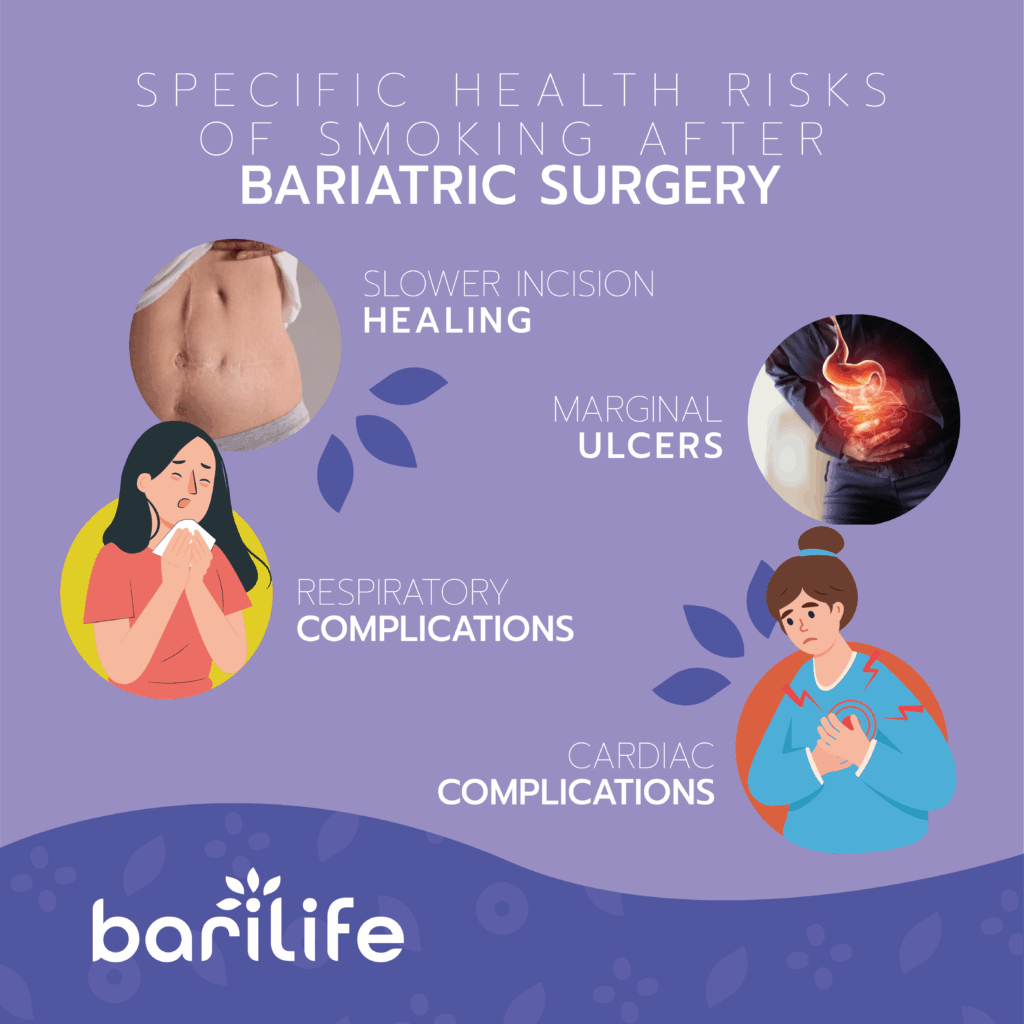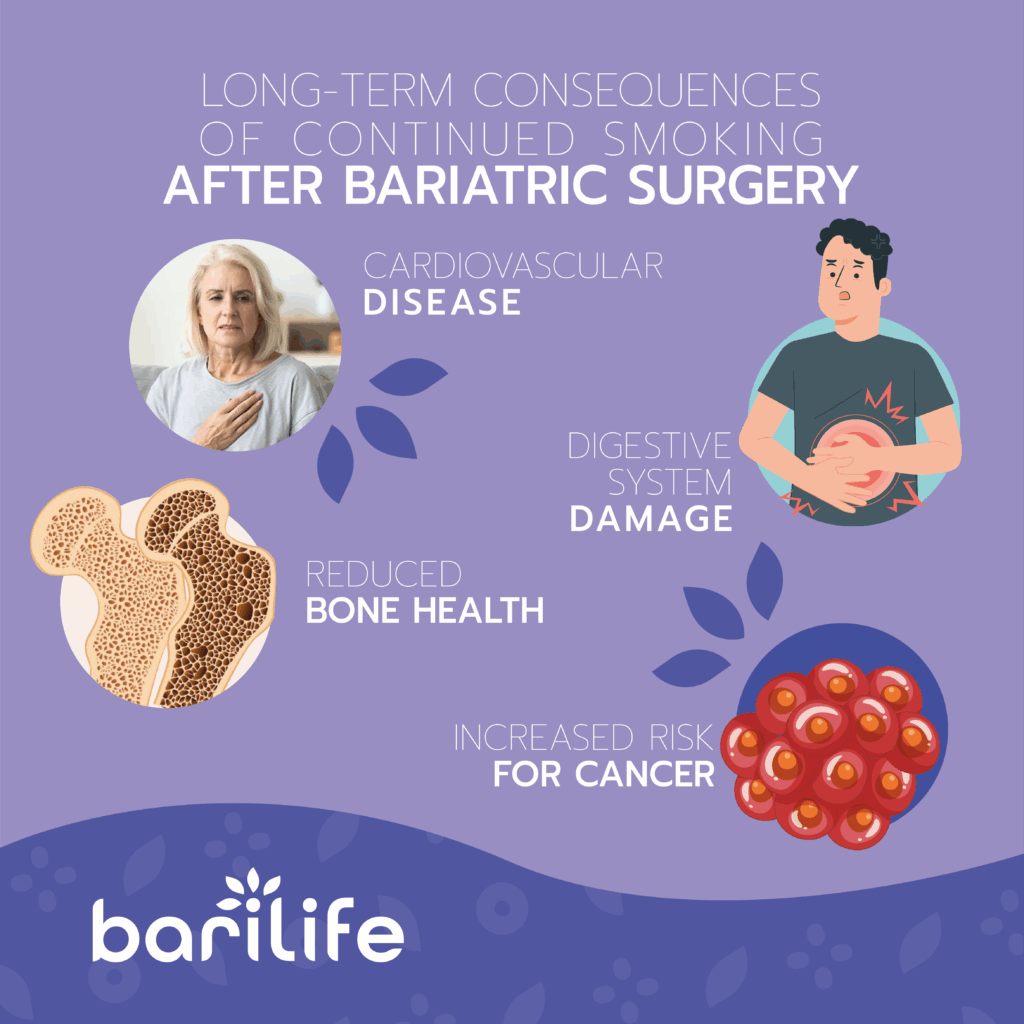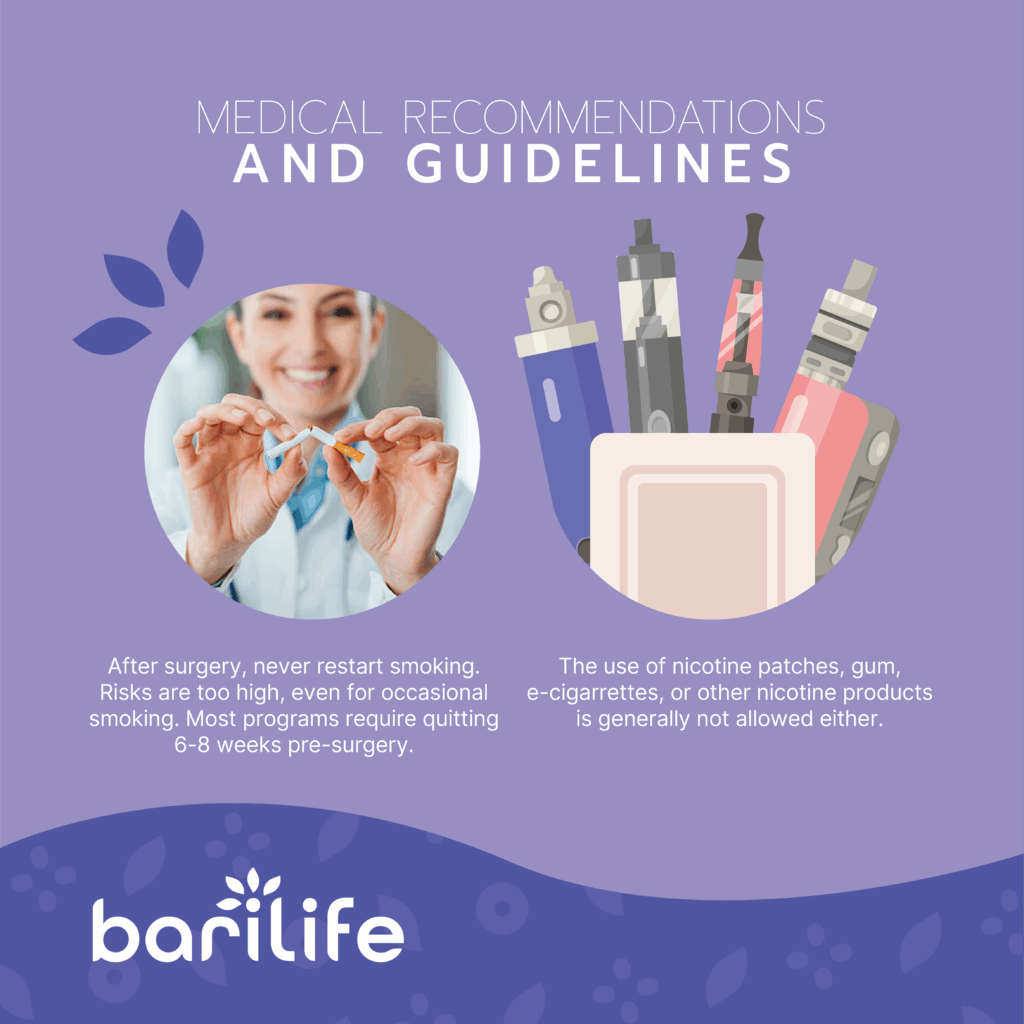Key Takeaways
- Quitting smoking before and after bariatric surgery significantly reduces your risk of complications and supports positive long-term outcomes.
- Smoking after bariatric surgery can lead to serious health problems, including ulcers, poor wound healing, and respiratory issues.
- Having the right support system and resources in place makes quitting smoking more successful, especially during your weight loss journey.
You might be wondering about smoking and how it affects your recovery after bariatric surgery. Whether you're a current smoker, recently quit, or worried about starting again after surgery, this article will give you the facts you need to make informed decisions about your health.
Life after bariatric surgery comes with many new adjustments. Bariatric surgery is a huge step toward better health, but smoking can seriously undermine the benefits you've worked so hard to achieve. Let's dive into why smoking and bariatric surgery don't mix well and what you can do if you're struggling with tobacco use.
[/box]
Why Smoking Is Harmful After Bariatric Surgery

When you undergo bariatric surgery, your body needs the best possible conditions to heal properly and adapt to the changes. Smoking creates numerous obstacles to this healing process.
The chemicals in cigarettes affect your blood flow and cause issues with the healing process and your body’s ability to fight off infection. These chemicals can also cause other complications, such as ulcers, and affect your lung and heart health.
Specific Health Risks of Smoking After Bariatric Surgery
Let’s talk more specifically about how smoking poses a health risk after bariatric surgery.
Slower Incision Healing
Wound healing is also severely impacted by smoking. The nicotine in cigarettes makes your blood vessels constrict, decreasing the flow of blood to your skin and other tissues. This leads to less oxygen and nutrients reaching your surgical wounds, slowing the healing process.
Marginal Ulcers
Even after you've recovered from the immediate surgical procedure, continued smoking can lead to serious problems like marginal ulceration. These painful ulcers develop where your stomach pouch connects to your small intestine and can cause severe complications that might require additional surgery.
These ulcers aren't just uncomfortable—they can cause serious problems, including bleeding, perforation, and strictures (narrowing of the connection point), which might require additional surgery to repair. Some people with severe ulcers need a feeding tube temporarily while the ulcers heal.
Risk of Infections
Smoking also weakens the immune system, making it challenging for the body to fight infections. This is particularly concerning after a major procedure like bariatric surgery, when the body is already under stress and working hard to heal.
Respiratory Complications
Respiratory complications are another major concern. After surgery, you're already at higher risk for breathing problems like pneumonia. Smoking multiplies this risk substantially. The irritants in cigarette smoke damage the tiny hair-like structures (cilia) in your lungs that help clear out mucus and debris, making it harder for you to cough effectively and clear your lungs after surgery.

Cardiac Complications
The impact on your cardiovascular system is another serious concern. Bariatric surgery aims to reduce your risk of heart disease and other weight-related health problems. However, smoking counteracts these benefits by damaging your blood vessels, increasing your blood pressure, and raising your risk of blood clots.
Impact on Weight Loss and Nutrient Absorption
You might be wondering if smoking affects your weight loss results after bariatric surgery. Interestingly, research suggests that smoking doesn't significantly impact how much weight you lose after surgery, but may interfere with nutrient absorption.
Affects On Weight Loss
For instance, a systematic review published in Surgical Endoscopy analyzed 20 studies and found that most reported no association between smoking habits and postoperative weight loss. A few studies noted minor differences in weight loss between smokers and non-smokers; however, these differences often became nonsignificant with longer follow-up periods.
Similarly, a retrospective chart review published in Surgical Endoscopy examined patients who underwent sleeve gastrectomy or Roux-en-Y gastric bypass and found no significant association between preoperative or postoperative smoking status and weight loss outcomes.
Affects On Nutrient Absorption
After bariatric surgery, your body already has challenges absorbing certain nutrients because your digestive system has been altered. Smoking may compound these issues.
While direct evidence linking smoking to specific nutrient deficiencies after bariatric surgery is limited, we do know that smoking affects how your body processes certain vitamins and minerals. For example, smokers typically have lower levels of vitamin C, which is required for wound healing and immune function, both critical after surgery.
Nicotine also interferes with your metabolism and how your body processes medications. This could affect how you absorb and utilize supplements, which are crucial after bariatric surgery to prevent nutritional deficiencies.

Many people report changes in taste and smell after they quit smoking. While this may seem like a minor issue, it can be beneficial after bariatric surgery. As your sense of smell and taste gets better, you might find greater satisfaction in smaller portions of food, which supports your weight loss goals.
Smoking can also mask hunger cues, which may seem helpful for weight loss but interfere with your ability to recognize when your body truly needs nourishment. After bariatric surgery, learning to respond appropriately to your body's hunger and fullness signals is an important skill for long-term success.
Psychological and Behavioral Risks
The journey after bariatric surgery involves significant lifestyle changes, and smoking can complicate this process in several ways.
Addiction Transfer
One concerning phenomenon is addiction transfer, sometimes referred to as transfer addiction after bariatric surgery. Some people who have struggled with food addiction find themselves turning to other substances, including nicotine, after bariatric surgery. If you can no longer use food to cope with stress or emotional issues, you might be more vulnerable to starting or resuming smoking as an alternative coping mechanism.
Anxiety and Depression
Smoking is also linked to mental health challenges like anxiety and depression. Many people who smoke report that cigarettes help them manage stress, but the reality is more complicated. While nicotine provides a temporary feeling of relaxation, it actually increases anxiety and tension between cigarettes. After bariatric surgery, your emotional well-being is particularly important for long-term success, and smoking can work against your mental health goals.
Reduced Compliance
There's also a connection between smoking and other health behaviors. Research shows that people who smoke are often less likely to follow medical recommendations in general. After bariatric surgery, you need to follow a specific diet, take supplements, stay hydrated, and exercise after bariatric surgery regularly. If smoking is part of a pattern of difficulty following health guidelines, it might signal broader challenges in adapting to your post-surgery lifestyle.

Long-Term Consequences of Continued Smoking After Bariatric Surgery
While the immediate risks of smoking after bariatric surgery are severe, the long-term consequences can be even more significant.
Cardiovascular Disease
Cardiovascular disease remains one of the biggest concerns. Bariatric surgery and smoking have opposite effects on your heart health —surgery typically improves your blood pressure, cholesterol levels, and diabetes risk, while smoking damages your blood vessels and increases inflammation throughout your body. Continuing to smoke after surgery essentially counteracts many of the heart-health benefits you would otherwise gain.
Digestive System Damage
Gastrointestinal issues can also persist or develop years after surgery if you continue to smoke. Beyond the immediate risk of marginal ulcers, smoking is associated with various digestive problems, including acid reflux, which can be particularly troublesome after certain types of bariatric procedures. Smokers also tend to have chronic inflammation in the stomach lining.
Decreased Survival Rate
Perhaps most concerning is the impact on long-term survival. One of the main goals of bariatric surgery is to help you live a longer, healthier life. Studies looking at long-term outcomes show that people who continue smoking after bariatric surgery don't experience the same reduction in mortality risk as non-smokers who have the surgery. In other words, continuing to smoke may cancel out one of the most important benefits of your surgery—a longer life expectancy.
Reduced Bone Health
Bone health is another long-term concern. After bariatric surgery, you're already at higher risk for bone density loss due to changes in nutrient absorption and weight-bearing. Smoking accelerates bone loss and increases your risk of fractures as you age. This combined effect makes protecting your bone health even more important. Engaging in toning exercises after bariatric surgery can help mitigate these risks by strengthening muscles and supporting bone density.
Increased Risk for Cancer

Cancer risk also remains elevated if you continue to smoke. While losing weight reduces your risk of several types of cancer, smoking is a top cause of various cancers, including lung, throat, bladder, and pancreatic cancer. The continued cancer risk from smoking may offset the risk reduction you get from weight loss.
Medical Recommendations and Guidelines
Healthcare providers have clear guidelines when it comes to smoking and bariatric surgery based on extensive research about the risks involved.
Most bariatric surgery programs require you to quit smoking completely at least 6-8 weeks before your surgery date. This time frame allows your body to begin recovering from some of the effects of smoking, reducing your surgical risks. Some surgeons may require even more extended periods of smoking cessation before they perform the procedure. Research suggests quitting one year before surgery is the best.
Nicotine testing is often part of the pre-surgical process. This means that using nicotine patches, gum, e-cigarettes, or other nicotine products is typically not allowed either. The concern isn't just about smoke inhalation—nicotine itself causes blood vessels to constrict and impairs healing.
After surgery, the recommendation is clear: don't start smoking again. Ever. The risks of smoking after bariatric surgery are too significant to justify even "occasional" or "social" smoking. If you've had bariatric surgery and smoking is still part of your life, quitting should be considered an essential part of your health journey, not an optional add-on.
Support for quitting smoking should be integrated into your bariatric care plan. This might include:
- Behavioral counseling to develop coping strategies
- Support groups with others who understand your challenges
- Medication to manage withdrawal symptoms (when appropriate)
- Regular follow-up to check your progress and adjust your plan

Don't get discouraged if you've tried to quit before and struggled. Many people make several attempts before quitting for good. Each attempt teaches you something about your triggers and what strategies might work better next time.
Your healthcare team should screen for smoking at every follow-up appointment. Being honest about your smoking status is crucial so they can help you find the right resources and support. They can also monitor you more closely for smoking-related complications if needed.
Conclusion
Quitting nicotine is one of the biggest steps you can take to ensure your surgery is a success. While it may seem challenging, especially when you're making many other lifestyle changes, the benefits far outweigh the difficulties of quitting.
Remember that bariatric surgery gives you a powerful tool for improving your health, but smoking can undermine many of these benefits. By combining successful weight management with smoking cessation, you give yourself the best possible chance for a longer, healthier life.
If you're struggling with nicotine and bariatric surgery recovery, reach out to your healthcare team. They've helped many people through this process and can provide the resources, support, and encouragement you need to succeed. You've already shown tremendous courage by choosing bariatric surgery—you have what it takes to overcome this challenge, too.
How Bari Life Can Help
Quitting smoking while recovering from bariatric surgery can place additional stress on your body during a critical healing period. Bari Life's specialized bariatric vitamins and nutritional supplements can provide vital support during this challenging time.
When you're dealing with smoking cessation and bariatric surgery recovery simultaneously, your body needs optimal nutrition to repair tissue, fight inflammation, and support overall healing. Our complete bariatric multivitamins, including options like bariatric multivitamin with iron and bariatric vitamins chewable, contain essential nutrients that may be depleted by smoking, including vitamins C and D, calcium, and B vitamins.
In addition to our vitamins, Bari Life offers a wide range of other supportive products such as

Leave a Comment
Your email address will not be published.